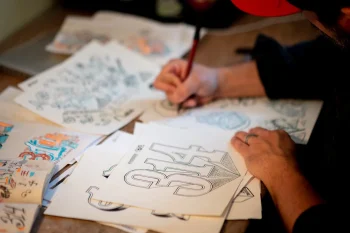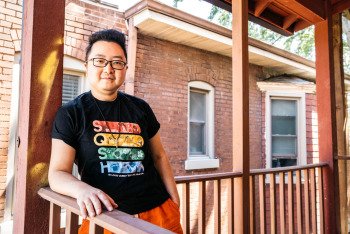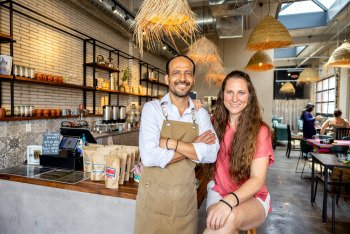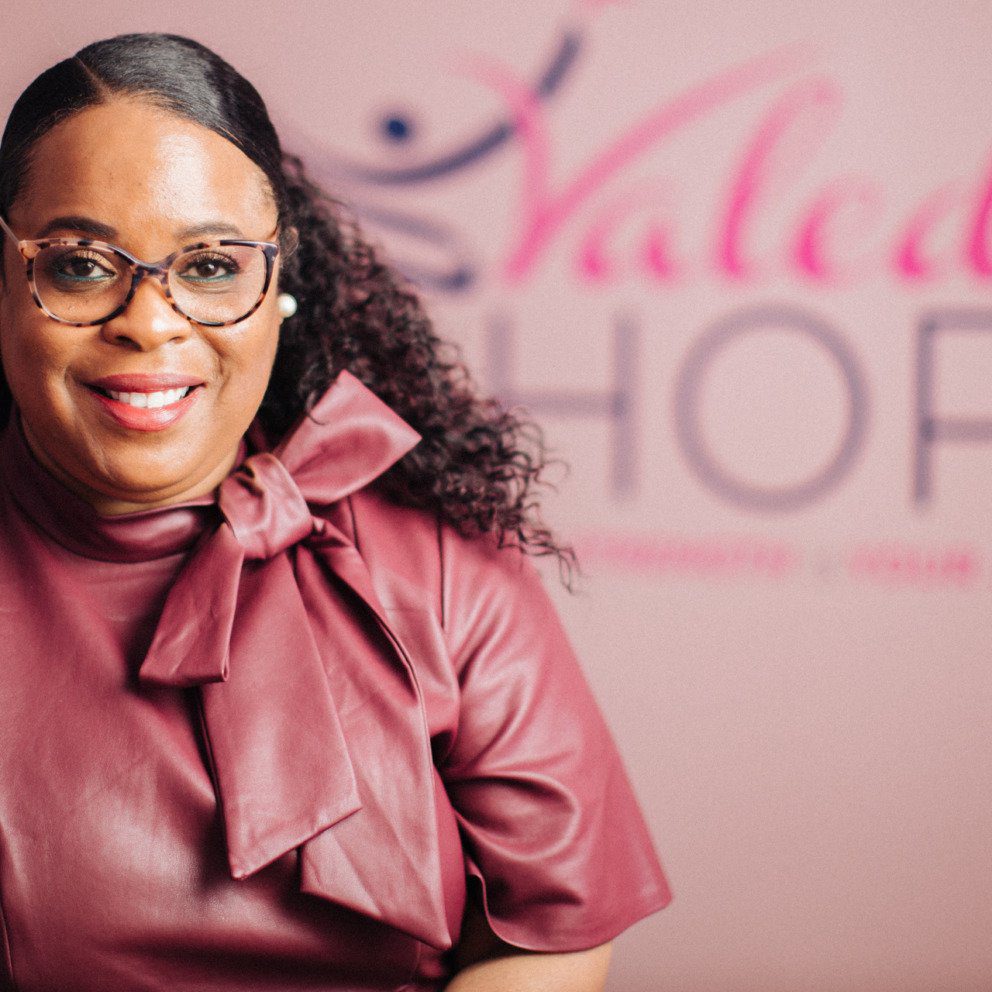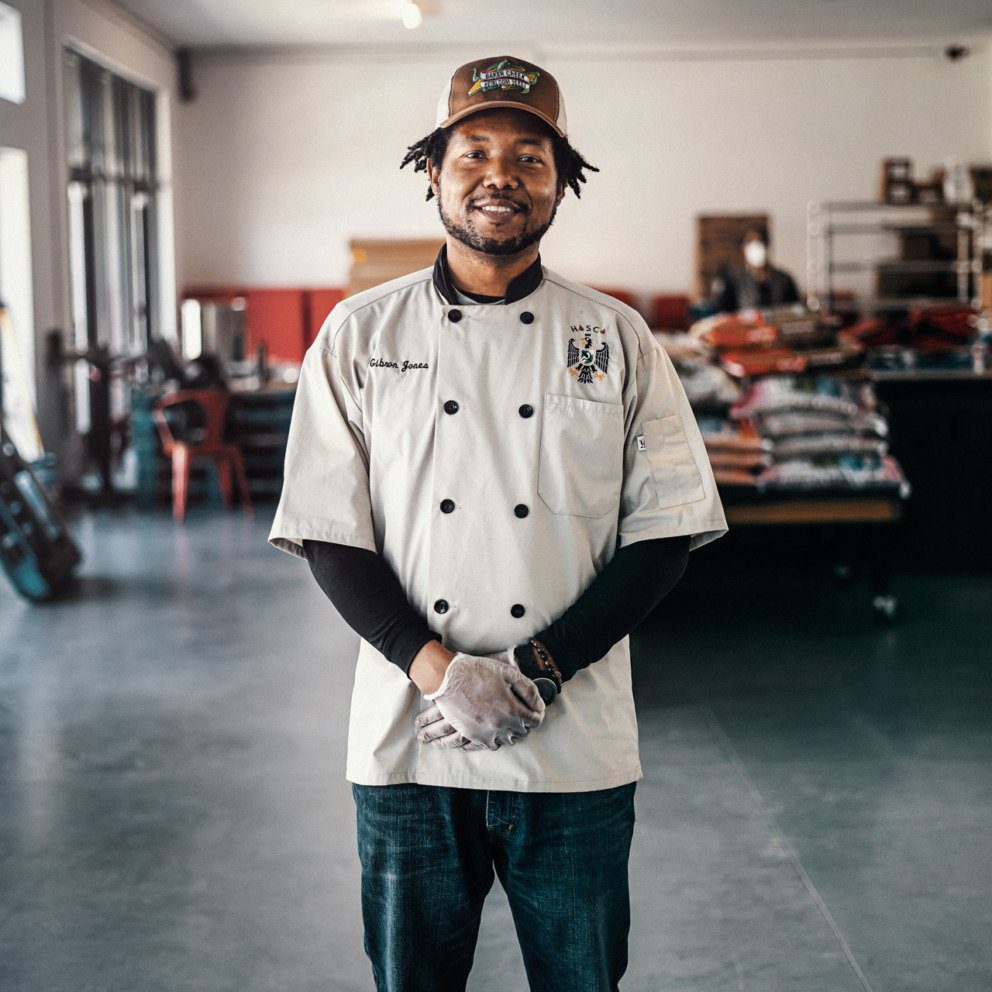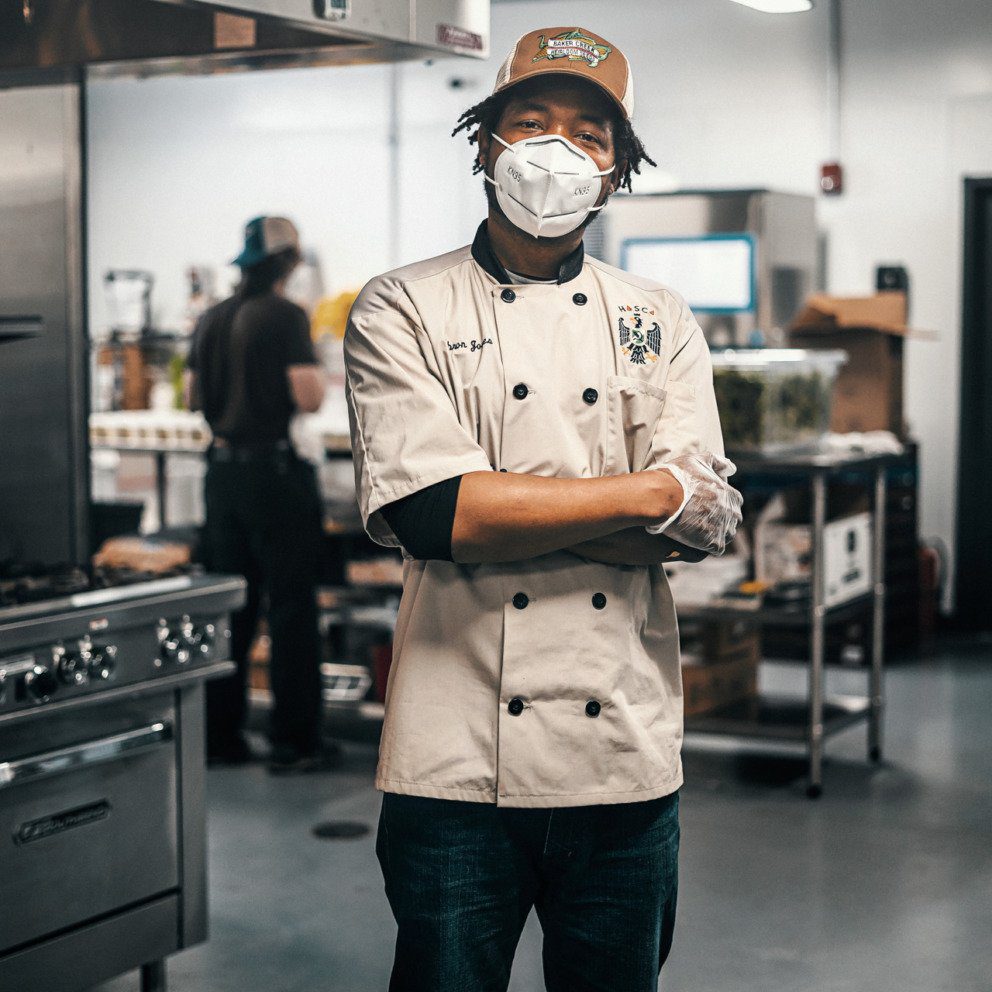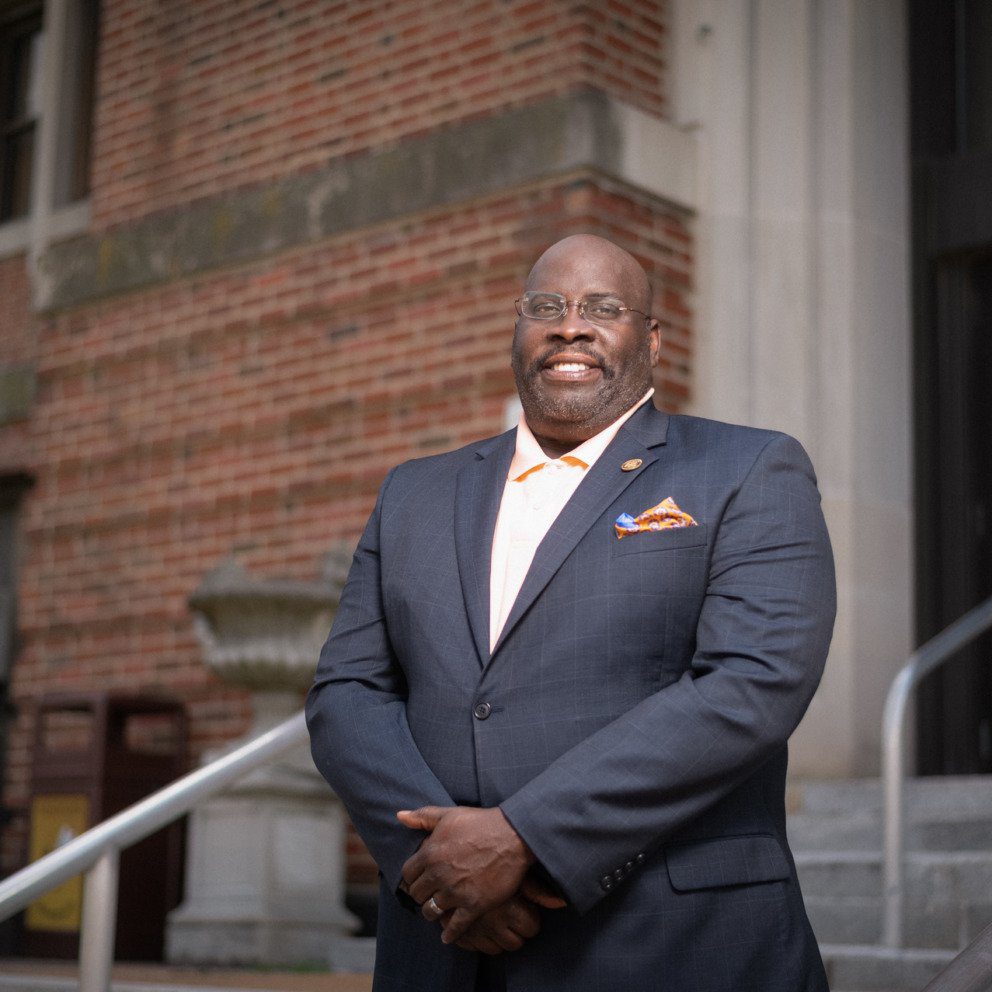Full Circle
Okunsola M. Amadou is improving health outcomes for Black women with a wraparound model of care at Missouri's first equal access midwifery clinic.
It’s not the typical entrepreneurial path, but on a trip to Ghana in 2013, Okunsola M. Amadou (previoulsy known as Tru) experienced a vision that propelled her to found Jamaa Birth Village back home in Ferguson, Missouri.
“When I saw the vision, it was of women and babies and family members in the center of a building, seeing a midwife and other providers, kids running around playing, women coming into that sacred space to get care,” Amadou recalls. “When I saw it, I was like, am I supposed to create that in America? I don’t know if I can do that there. I wanted to stay in Africa and make it happen. And the vision was very clear that no, it was my people in my community who needed and deserved that. And so here we are, seven years later, with my people in my community.”
Jamaa Birth Village opened its doors on Juneteenth in 2020, and is the first equal access midwifery clinic in Missouri. As Missouri’s first certified Black midwife, Amadou is providing holistic, culturally congruent care for Black women during pregnancy and beyond.
One of the first things any visitor to Jamaa will notice is the abundance of the color purple throughout the space.
“Purple is a very royal color in our African tradition. In thinking about how we can reintegrate African cultural traditions into community-based maternity care, purple was just right,” she explains. And the color is only one part of the clinic’s design. “When you go through every room, all the art tells a story. A lot of our clients did a lot of the art for us. We really wanted to celebrate Blackness, the divinity of it and the power and the value in being Black.”
Amadou wanted this message to be be recognized from the moment her patients open Jamaa’s purple front door, where they are greeted by a gorgeous hand-painted mural depicting a pregnant Black woman whose Black doula is using a Pinard horn to listen to her baby’s heartbeat. A child is next to her, and underneath her are multiple hands, holding up the mother and her babies, symbolizing the support that Jamaa provides to the whole family.
Pregnancy is a Health Care Crisis for Black Mothers
In the U.S., more women are dying of pregnancy-related complications than any other developed country, and pregnant Black women are three to five times more likely to die in pregnancy and childbirth than White women.
“There are very, very challenging health disparities that are plaguing the Black community in America,” Amadou says. “And the CDC has reported that 60% of maternal mortality cases are preventable. When we look at the cases of Black women dying in childbirth or within the first year of having their baby, most of them are due to negligence, which then ties back into bias and racism and the lack of really hearing and listening to the women who are saying ‘I’m in pain, something’s wrong.’”
Amadou speaks from firsthand experience, having encountered bias and racism during the pregnancies and births of her oldest two children.
“It feels like your soul is ripped from you when you are traumatized in childbirth,” Amadou explains. “If you were disrespected or taken advantage of, it imprints on you.”
She started Jamaa Birth Village so other Black women would have a better experience than she did, but Amadou didn’t limit her goals to healthy pregnancies and babies. “Jamaa” means family in Swahili, and she chose it for her organization because it represented what her patients are to her, and the wraparound care she provides to them.
Amadou talks about her inspiration to have Jamaa be a collective community force.
Amadou decided to become a midwife after searching for a Black midwife to attend her third birth and realizing that there were none in Missouri. Nationally, less than 2 percent of midwives are Black. So Amadou began studying to be a midwife, while supporting Black women as a doula. In 2019, she became the first certified Black midwife in Missouri.
“When you think about the same disparities that our moms face in childbirth, we face those same disparities in midwifery. There’s a lot of racism steeped into it. So I had to really go through a lot of oppression and disrespect and bullying and not give up,” Amadou says. “When I graduated, I cried, I shouted, I had so many different emotions, but most of all, I was so grateful. So many people rallied together to fundraise to make sure that I had money for books and that I had money to get to my clinical placements. Everybody was really, really rooting for me. So I was happy that I was able to keep my word and be the midwife that my community needed and wanted me to be.”
The Holistic Model of Care
Having a doula has been shown to reduce the risk of having a cesarean section and increase the chances of breastfeeding success; This is especially important given that Black women have higher rates of c-sections and lower rates of breastfeeding success than White women. In the past five years, Amadou has trained nearly 100 doulas of color, and founded the St. Louis Doulas of Color Collective as a support network for those birth professionals.
“The doula is there to be a supportive advocate and to facilitate communication between the provider and the client. Oftentimes the provider talks over the client’s head as if they don’t even know what’s going on with their own bodies,” Amadou says. “It’s not only important to be educated and informed, but to have a skilled person there with you that can assist you, because your women are wanting to be focused on birthing their babies.”
“Our numbers definitely are reflecting that we are improving birth outcomes, and women are thriving a lot better than if they were to go into the hospitals unequipped.”
Amadou explains Jamaa's model of care, and the importance of doulas.
Amadou’s mission with Jamaa is to equip women for more than just going to the hospital to give birth. She is leading a revolution in the model of care for pregnant Black women, one that recognizes that pregnancy impacts every part of the woman’s life – and that every part of a woman’s life can have an affect on her pregnancy and birth.
Through the “Jamaa Succeeds” community health worker program, Amadou and her staff work with families for two years to make sure that they have socioeconomic stability, assisting with everything from further education to transportation to better housing.
“We walk through the goals of them as individuals and their families for two years to make sure that when they leave Jamaa, they didn’t just survive childbirth,” Amadou says, “but they’re actually thriving as an individual and as a family.”
In addition, Jamaa offers a massage therapist, a chiropractor and a spa that offers therapeutic holistic care services postpartum to help women recover from childbirth.
“What we’re realizing is that women and families who are already marginalized, maybe living below the poverty line, the last thing they’re thinking about is treating themselves to a massage or going to see the chiropractor and really that’s just what they need,” says Amadou. “It’s not just important to eat well and exercise and see your provider when you’re pregnant, but it’s also important to practice self-care and collective care, allowing other people to care for you and regular rest and relaxation. So that they’re not tensed and stressed when it’s time for child birth, which can inhibit a healthy childbirth and postpartum period.”
One of the rooms at Jamaa has been devoted to be a play space, so mothers can feel comfortable bringing their children in to an appointment and not have to worry about finding childcare. Another room is set up as a kitchen, where they can teach about good nutrition and share recipes with families after involving them in their garden program.
“Within our organic gardens, we grow crops and we also grow herbs, but we work with our clients and our patients and allow them to go to the gardens with us. They can learn how to sow seeds and tend to the garden beds, water them and harvest the food,” Amadou says. “And we operate a community supported agriculture (CSA) program. All of our families have access to the food from these gardens for free.”
All of these services are offered in the building at 40 North Florissant Road in Ferguson. In a full-circle moment, when Amadou first began meeting with pregnant women to start Jamaa, she held those gatherings at the Ferguson Library which is directly across the street from Jamaa’s new home.
The building that now houses Jamaa fell into Amadou’s hands when two area physicians who previously practiced in the space donated it, with the caveat that Amadou would have to raise $60,000 to close on it.
“The challenge that I had is when I started Jamaa Birth Village, I was low income myself. I was a doula and I was charging like $300 a birth,” Amadou says. “So I was on Medicaid. I was receiving food stamps. But it was not going to stop me from investing my time and my energy into my community and to the women who needed support. I kept going, and I would say within year three, Jamaa really began to be recognized for the powerful strength that it is.”
One of the organizations that took notice of the work Amadou was doing was Together Rising, a national nonprofit that gave the first capital funds that allowed the building renovation to happen and the clinic to come to life. It’s been an incredible journey for Amadou from her initial vision to opening the doors of Jamaa’s beautifully planned and designed facility on Juneteenth in 2020.
Amadou recalls how the community's generosity made acquiring and renovating Jamaa's new building possible.
“It’s so beautiful to see the initial struggle of me trying to advocate and be in the community and work with some of my peers and say, ‘Hear us, listen to us. We deserve better. We want better. We’re dying, we’re being harmed. We feel taken advantage of,’” Amadou says. “And then to turn a corner and to have this abundance of outpouring of love, and everybody’s saying, ‘We want you here. We need you here.’ It’s been amazing.”
Join the Story
- Book an appointment at Jamaa Birth Village here.
- Looking for a doula of color? Check out the St. Louis Doulas of Color Collective.
- Learn about high maternal and infant mortality rates in St. Louis county here.
- Read about the maternal mortality rate for Black women in this article from the magazine of the Harvard T.H. Chan School of Public Health, America is Failing Its Black Mothers.
- Read this article from the New York Times on why being Black and giving birth during the pandemic is so dangerous.
- From the Washington Post, read this article featuring Amadou: Black women are facing a childbirth mortality crisis. These doulas are trying to help.
